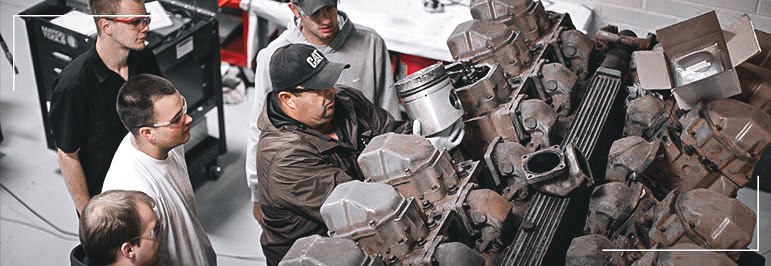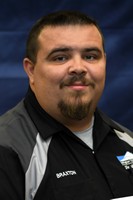Diesel Technology

Diesel Technology - Certificate - Heavy Duty Chassis Maintenance and Repair
If you’d like a high-paying career upon graduating from BTC, then you should consider Diesel. You’ll be prepared to work right away as a diesel technician, repairing and maintaining heavy trucks, buses, and road equipment like bulldozers and graders. Other positions you’d qualify for are diesel engine specialist, truck technician, marine technician, and construction and industrial machinery repair technician.
You will learn how to use leading-edge diesel technology, and work hands-on in an actual shop. Employers who hire graduates from the Diesel program include diesel automotive and trucking companies, rental companies, marine dealers, highway contractors, and farm and heavy equipment companies.
Employment Information
Data are provided on a program (not credential) level
85% BTC graduate placement rate1
$57,595 starting annual wage2
$70,903 average annual wage2
$86,953 potential annual wage2
Entry Information
When Can I Start?
This program admits students once a year, in the fall quarter.
Additional Requirements:
Prior to enrolling in program classes, during the mandatory GET Started appointment, students will be required to present and attest the following to the Outreach, Advising, and Counseling Department:
- Present your valid driver's license;
- Attest that you presented a valid driver’s license to your program advisor and that you will notify your program faculty immediately if your driver’s license is suspended OR restricted for any reason.
Important Program Notes:
- While it is not required to have a clean driving record to enter the program, some employers and internship providers in this field may only hire applicants who have a clean driving record;
- All General Education courses must be completed prior to the beginning of the 2nd year of the program.
What are the Minimum Entry Requirements?
A completed college admissions application and placement in English and math. BTC uses a Guided Self-Placement process to help you choose the best starting point for your English and math courses. Your selections will determine whether you begin with program coursework or complete prerequisites classes first.
To get started or for help determining your English and math placement, contact the Outreach department at Outreach@btc.edu.
What are My Next Steps?
Classes
Total Program Credits: 62
Quarter 1
AUTO 113 HVAC 4 CR DET 100 Introduction to Diesel Technology 8 CR DET 102 Introduction to Diesel Technology Lab 4 CR AENGL 100 Applied English 5 CR or higher Quarter 2
DET 125 Service Industry Support 4 CR DET 130 Chassis Electrical Systems 8 CR DET 132 Chassis Electrical Systems Lab 4 CR AMATH 100 Applied Occupational Math 5 CR or higher Quarter 3
DET 134 Heavy Duty Chassis Systems 9 CR DET 136 Heavy Duty Chassis Systems Lab 6 CR CMST& 210 Interpersonal Communication 5 CR OR PSYC& 100 General Psychology 5 CR OR SOC& 101 Introduction to Sociology 5 CR
Program Outcomes
After successfully completing the Heavy Duty Chassis Maintenance and Repair certificate, students will be able to:
- Comply with personal and environmental safety practices specific to the diesel industry.
- Perform fundamental maintenance and repairs on diesel equipment.
- Provide critical thinking skills while utilizing technical information to perform various repairs.
- Communicate work performed using trade specific language while documenting critical aspects clearly and concisely.
- Diagnose and repair fundamental electrical and electronic systems.
Employment Outlook
Jobs & Employment
The need for diesel technicians is high. People who enter this field will find favorable opportunities, especially as the need to replace workers who retire increases over the next decade.
Driving citations will restrict or prevent student participation in some lab activities, internships and employment in the diesel repair industry.
Program graduates work as diesel technicians, repairing and maintaining the diesel engines that power transportation equipment, such as heavy trucks and buses. Other options include working on bulldozers, cranes, road graders, farm tractors, combines boat repair or service on a variety of diesel-powered electric generators, compressors, and pumps used in oil well drilling and irrigation systems.
Employers include diesel dealerships, diesel repair companies, diesel trucking companies, diesel marine dealers, farm equipment companies, and highway contractors. Potential positions include diesel engine specialist, truck technician, bus technician, construction and industrial machinery repair person, marine technician, ASE certified specialist, engine overhaul mechanic and service manager.
Faculty & Support

Marshall Link
Diesel Technology
Braxton Shannon
Diesel TechnologyContacts
If you have questions about this program or want help with the admissions steps to Bellingham Technical College, please email outreach@btc.edu.
Current students wanting academic planning and support, can connect with the program Instructor(s) or email TransportationNav@btc.edu
